You are here
- Home
- Could Indigenous Knowledge Hold Key to Reducing Wildfires?
Could Indigenous Knowledge Hold Key to Reducing Wildfires?
26 May 2016

The recent wildfire that devastated the community of Fort McMurray, Canada was not a one-off incident. Over the last decades wildfires have wreaked havoc around the world, resulting in the loss of life, destroying property, contributing to greenhouse gas emissions and impacting on biodiversity. Now, a paper by Jay Mistry (Royal Holloway, University of London), Bibiana Bilbao (Simón Bolívar University, Venezuela) and Andrea Berardi (OU) presents evidence from Venezuela, Brazil and Guyana that the fire-management knowledge and skills of many Indigenous peoples could help prevent large-scale wildfires, while at the same time maintaining local cultures.
Analysis of satellite imagery suggests that Indigenous lands have the lowest incidence of wildfires. In the Brazilian Amazon, for example, from 2000 to 2012 forest loss was more than ten times lower in such areas than in comparable regions. However, acknowledgement of indigenous peoples' role in fire management remains limited, and in many cases dismissed, especially in policy-making circles. Instead, policies and institutional structures emphasise fire-fighting, which in many cases leads to an increase in fire occurrence. In addition, such community-owned solutions are being undermined by approaches that aim to incorporate them into market, incentive-based ones for climate change mitigation.
Community-owned Solutions for Fire Management in Tropical Ecosystems: Case Studies from Indigenous Communities of South America, published in the Royal Society of London journal Philosophical Transactions B issue on The Interaction of Fire and Mankind, highlights the way in which fire is used by Indigenous peoples for a variety of purposes that have interconnected ecological, social and spiritual importance. Ecosystems are protected not because they are being 'managed' in a direct way, but as the indirect outcomes of a healthy social-ecological system.
The paper therefore calls for the promotion of Indigenous fire practices as a low-tech, sustainable solution to wildfire threats, as well as a useful lens through which to learn both practical fire management solutions and wider lessons on how environmental governance could be better structured and implemented.
Share this page:
Monthly Archive
- March 2024 (1)
- November 2023 (1)
- February 2023 (1)
- January 2023 (1)
- November 2022 (1)
- October 2022 (1)
Contact us
To find out more about our work, or to discuss a potential project, please contact:
International Development Research Office
Faculty of Arts and Social Sciences
The Open University
Walton Hall
Milton Keynes
MK7 6AA
United Kingdom
T: +44 (0)1908 858502
E: international-development-research@open.ac.uk
.jpg)